As 3D printing continues to find uses in the fields of medicine and science, it appears that the process could also have applications in law enforcement. A report by Fusion states that police in Michigan want to create a 3D model of a murder victim's fingers to unlock his smartphone.
Police approached Michigan University Department of Computer Science & Engineering professor Anil Jain to find out if his team could manufacture a replica of the dead man's fingers so they could access the device and look for clues as to who may have committed the crime.
The victim in the case had previously been arrested, so his fingerprint scans were in the police database. These were sent to Jain and his PhD student, Sunpreet Arora, who used them to 3D print all ten of the dead man's digits - just to make sure they created the one he used to lock/unlock the device.
Just pushing the plastic fingers against the scanner wouldn't work as they're not conductive enough, so Aurora is coating the prints with a thin layer of metallic particles to get around this issue.
It's still not certain that the technique will work and the project will take several more weeks to complete, which poses a big problem: most modern smartphones require a PIN to be entered if they haven't been used for a certain amount of hours - eight, in the case of an iPhone - or if they've been powered off and on again.
The worry with this technique is that it could set a precedent that results in authorities being able to access the devices of anyone who has submitted to fingerprint scans.
Precise details of the crime and the device in question are unknown as the investigation is ongoing. It has been pointed out that the victim's body was too decayed for his fingerprint to be applied directly to the phone.
Check out the video clip below to see Jain exposing fingerprint spoof attacks.
